Unilever's Business Operations and Management: A Detailed Report
VerifiedAdded on 2023/06/17
|9
|2488
|424
Report
AI Summary
This report provides a detailed analysis of Unilever's business operations and management strategies, covering key functions such as quality control, location strategies, leadership, and logistics. It evaluates the company's operations management decisions, focusing on human resource management and production functions, including recruitment, training, and factors of production. The report also offers recommendations for improving Unilever's organizational effectiveness, such as enhancing training programs, seizing market opportunities, strengthening the balance sheet, mitigating Brexit threats, and developing effective marketing frameworks. The conclusion emphasizes the importance of effective business operations and strategic management for achieving success in target markets.
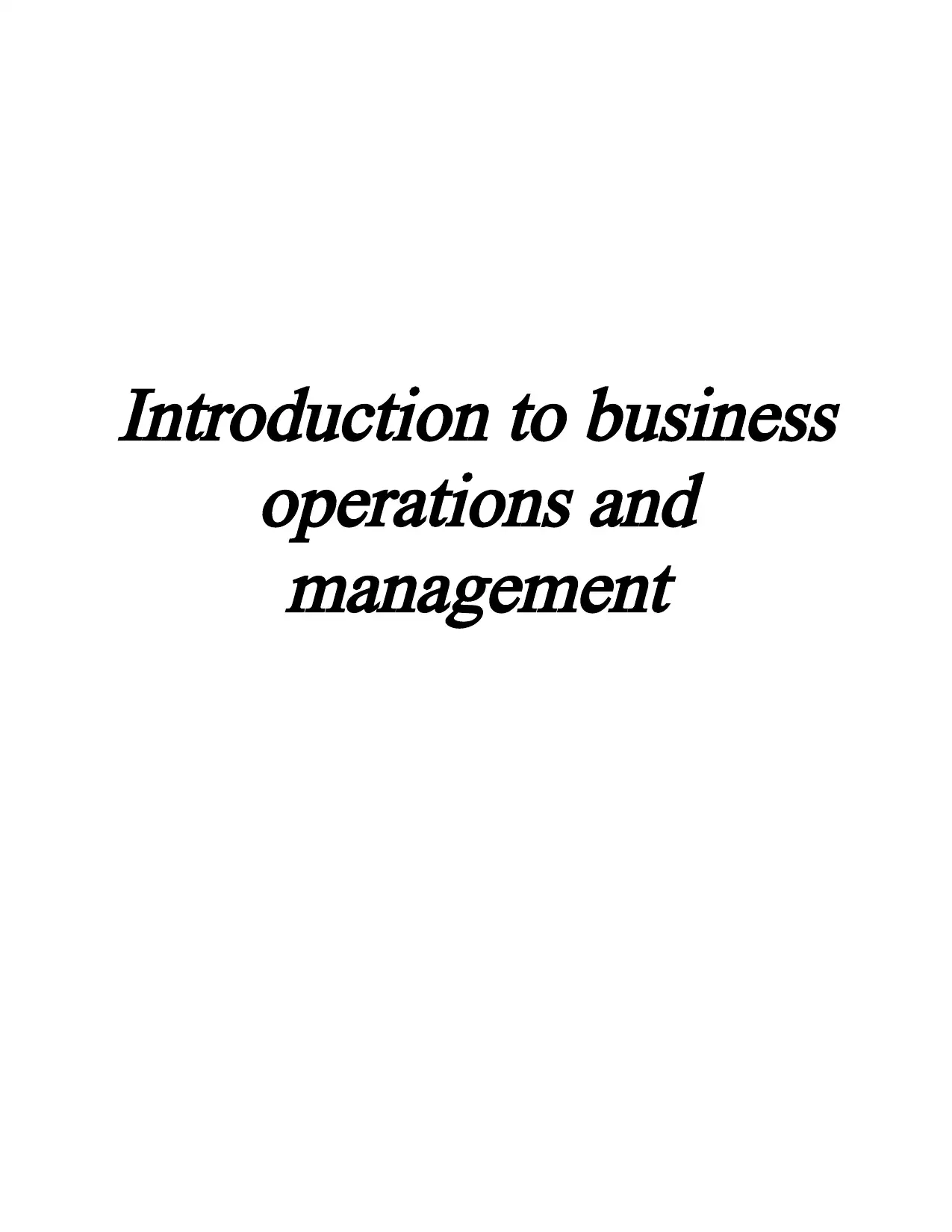
Introduction to business
operations and
management
operations and
management
Paraphrase This Document
Need a fresh take? Get an instant paraphrase of this document with our AI Paraphraser
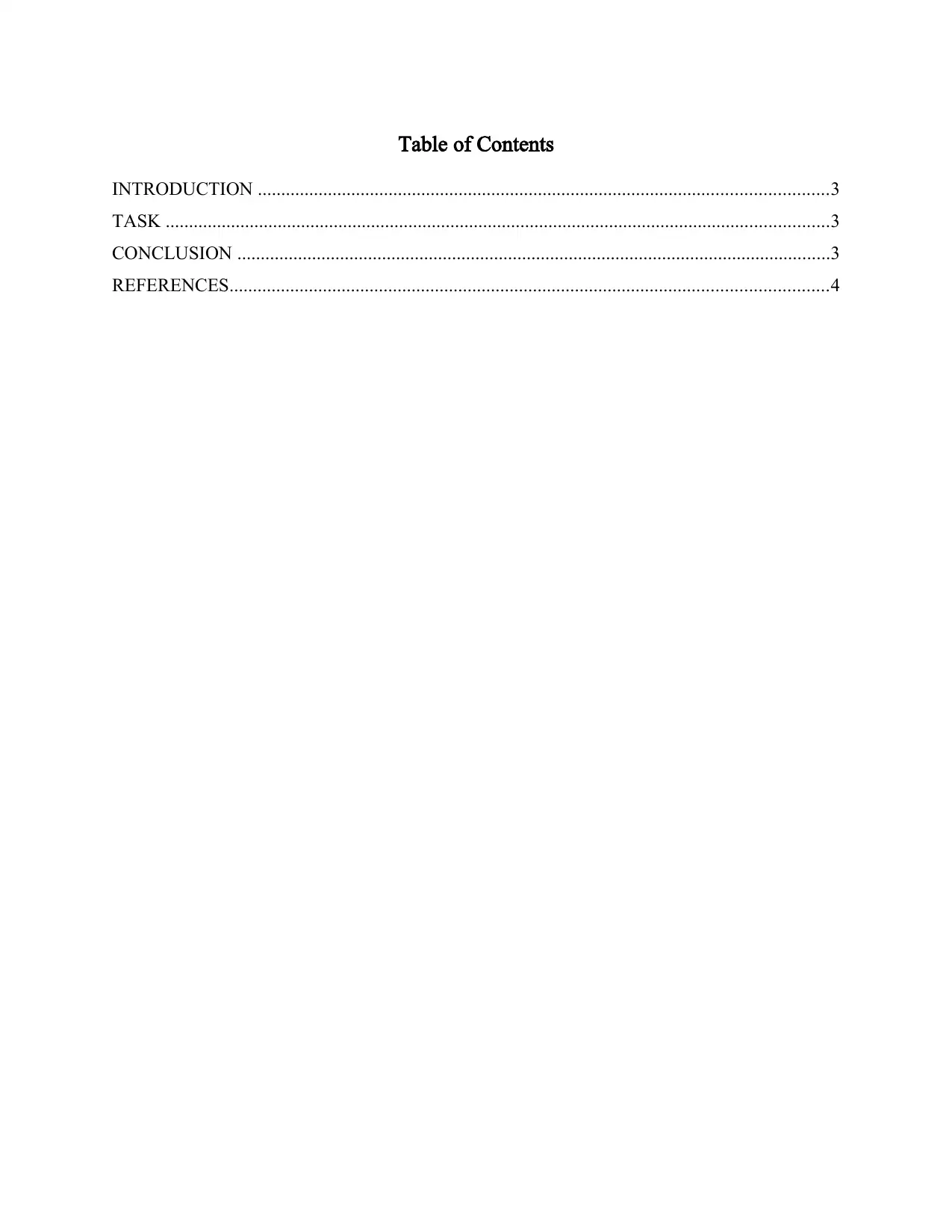
Table of Contents
INTRODUCTION ..........................................................................................................................3
TASK ..............................................................................................................................................3
CONCLUSION ...............................................................................................................................3
REFERENCES................................................................................................................................4
INTRODUCTION ..........................................................................................................................3
TASK ..............................................................................................................................................3
CONCLUSION ...............................................................................................................................3
REFERENCES................................................................................................................................4
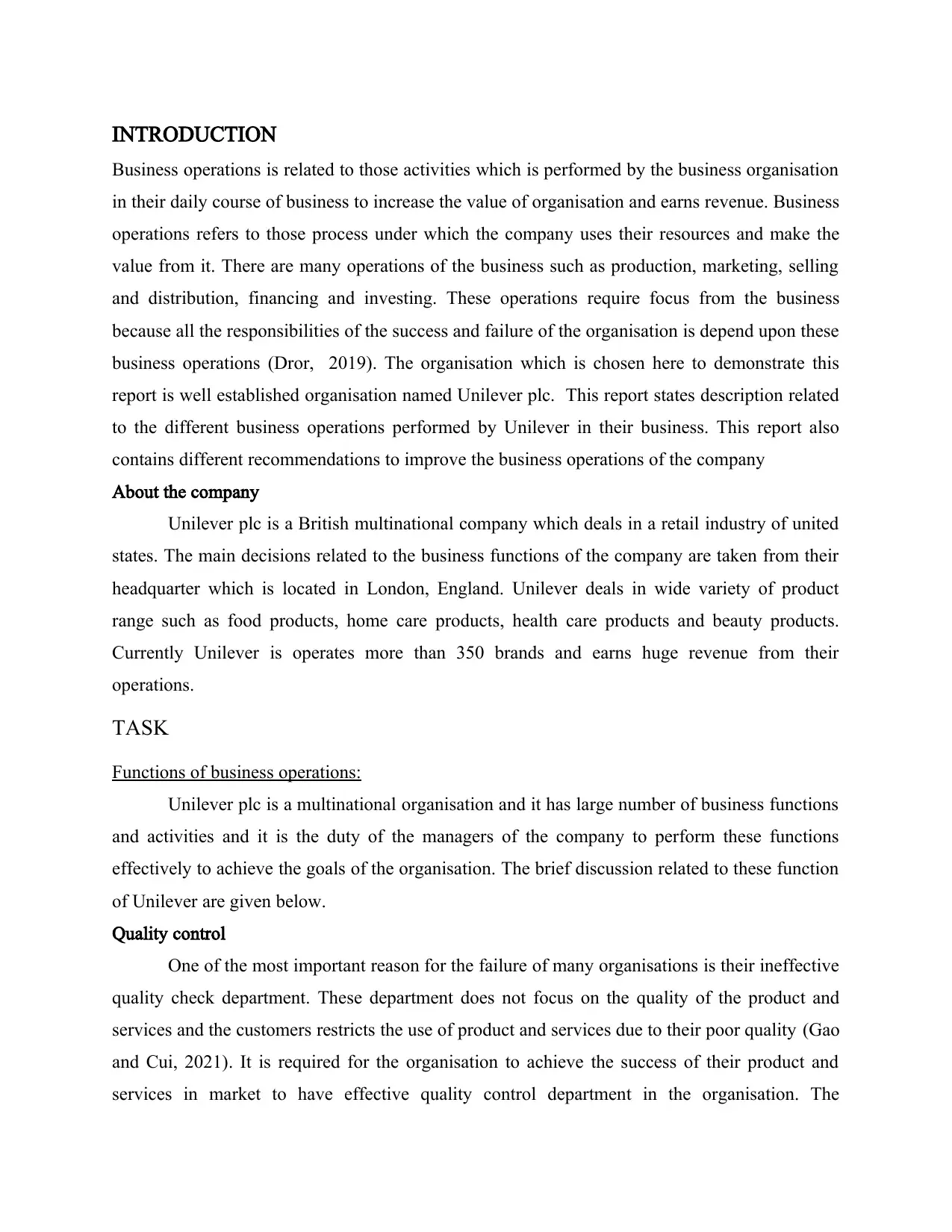
INTRODUCTION
Business operations is related to those activities which is performed by the business organisation
in their daily course of business to increase the value of organisation and earns revenue. Business
operations refers to those process under which the company uses their resources and make the
value from it. There are many operations of the business such as production, marketing, selling
and distribution, financing and investing. These operations require focus from the business
because all the responsibilities of the success and failure of the organisation is depend upon these
business operations (Dror, 2019). The organisation which is chosen here to demonstrate this
report is well established organisation named Unilever plc. This report states description related
to the different business operations performed by Unilever in their business. This report also
contains different recommendations to improve the business operations of the company
About the company
Unilever plc is a British multinational company which deals in a retail industry of united
states. The main decisions related to the business functions of the company are taken from their
headquarter which is located in London, England. Unilever deals in wide variety of product
range such as food products, home care products, health care products and beauty products.
Currently Unilever is operates more than 350 brands and earns huge revenue from their
operations.
TASK
Functions of business operations:
Unilever plc is a multinational organisation and it has large number of business functions
and activities and it is the duty of the managers of the company to perform these functions
effectively to achieve the goals of the organisation. The brief discussion related to these function
of Unilever are given below.
Quality control
One of the most important reason for the failure of many organisations is their ineffective
quality check department. These department does not focus on the quality of the product and
services and the customers restricts the use of product and services due to their poor quality (Gao
and Cui, 2021). It is required for the organisation to achieve the success of their product and
services in market to have effective quality control department in the organisation. The
Business operations is related to those activities which is performed by the business organisation
in their daily course of business to increase the value of organisation and earns revenue. Business
operations refers to those process under which the company uses their resources and make the
value from it. There are many operations of the business such as production, marketing, selling
and distribution, financing and investing. These operations require focus from the business
because all the responsibilities of the success and failure of the organisation is depend upon these
business operations (Dror, 2019). The organisation which is chosen here to demonstrate this
report is well established organisation named Unilever plc. This report states description related
to the different business operations performed by Unilever in their business. This report also
contains different recommendations to improve the business operations of the company
About the company
Unilever plc is a British multinational company which deals in a retail industry of united
states. The main decisions related to the business functions of the company are taken from their
headquarter which is located in London, England. Unilever deals in wide variety of product
range such as food products, home care products, health care products and beauty products.
Currently Unilever is operates more than 350 brands and earns huge revenue from their
operations.
TASK
Functions of business operations:
Unilever plc is a multinational organisation and it has large number of business functions
and activities and it is the duty of the managers of the company to perform these functions
effectively to achieve the goals of the organisation. The brief discussion related to these function
of Unilever are given below.
Quality control
One of the most important reason for the failure of many organisations is their ineffective
quality check department. These department does not focus on the quality of the product and
services and the customers restricts the use of product and services due to their poor quality (Gao
and Cui, 2021). It is required for the organisation to achieve the success of their product and
services in market to have effective quality control department in the organisation. The
⊘ This is a preview!⊘
Do you want full access?
Subscribe today to unlock all pages.

Trusted by 1+ million students worldwide
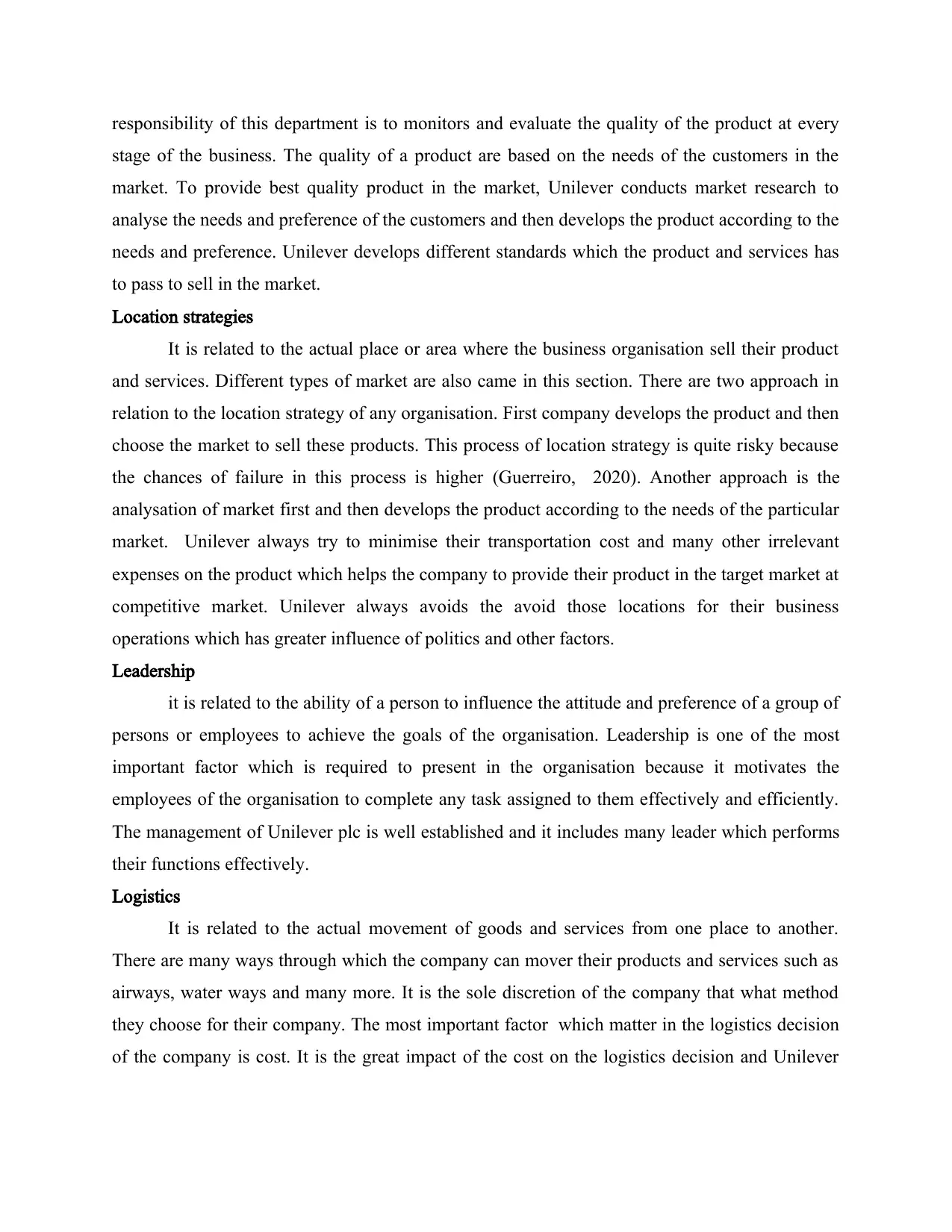
responsibility of this department is to monitors and evaluate the quality of the product at every
stage of the business. The quality of a product are based on the needs of the customers in the
market. To provide best quality product in the market, Unilever conducts market research to
analyse the needs and preference of the customers and then develops the product according to the
needs and preference. Unilever develops different standards which the product and services has
to pass to sell in the market.
Location strategies
It is related to the actual place or area where the business organisation sell their product
and services. Different types of market are also came in this section. There are two approach in
relation to the location strategy of any organisation. First company develops the product and then
choose the market to sell these products. This process of location strategy is quite risky because
the chances of failure in this process is higher (Guerreiro, 2020). Another approach is the
analysation of market first and then develops the product according to the needs of the particular
market. Unilever always try to minimise their transportation cost and many other irrelevant
expenses on the product which helps the company to provide their product in the target market at
competitive market. Unilever always avoids the avoid those locations for their business
operations which has greater influence of politics and other factors.
Leadership
it is related to the ability of a person to influence the attitude and preference of a group of
persons or employees to achieve the goals of the organisation. Leadership is one of the most
important factor which is required to present in the organisation because it motivates the
employees of the organisation to complete any task assigned to them effectively and efficiently.
The management of Unilever plc is well established and it includes many leader which performs
their functions effectively.
Logistics
It is related to the actual movement of goods and services from one place to another.
There are many ways through which the company can mover their products and services such as
airways, water ways and many more. It is the sole discretion of the company that what method
they choose for their company. The most important factor which matter in the logistics decision
of the company is cost. It is the great impact of the cost on the logistics decision and Unilever
stage of the business. The quality of a product are based on the needs of the customers in the
market. To provide best quality product in the market, Unilever conducts market research to
analyse the needs and preference of the customers and then develops the product according to the
needs and preference. Unilever develops different standards which the product and services has
to pass to sell in the market.
Location strategies
It is related to the actual place or area where the business organisation sell their product
and services. Different types of market are also came in this section. There are two approach in
relation to the location strategy of any organisation. First company develops the product and then
choose the market to sell these products. This process of location strategy is quite risky because
the chances of failure in this process is higher (Guerreiro, 2020). Another approach is the
analysation of market first and then develops the product according to the needs of the particular
market. Unilever always try to minimise their transportation cost and many other irrelevant
expenses on the product which helps the company to provide their product in the target market at
competitive market. Unilever always avoids the avoid those locations for their business
operations which has greater influence of politics and other factors.
Leadership
it is related to the ability of a person to influence the attitude and preference of a group of
persons or employees to achieve the goals of the organisation. Leadership is one of the most
important factor which is required to present in the organisation because it motivates the
employees of the organisation to complete any task assigned to them effectively and efficiently.
The management of Unilever plc is well established and it includes many leader which performs
their functions effectively.
Logistics
It is related to the actual movement of goods and services from one place to another.
There are many ways through which the company can mover their products and services such as
airways, water ways and many more. It is the sole discretion of the company that what method
they choose for their company. The most important factor which matter in the logistics decision
of the company is cost. It is the great impact of the cost on the logistics decision and Unilever
Paraphrase This Document
Need a fresh take? Get an instant paraphrase of this document with our AI Paraphraser
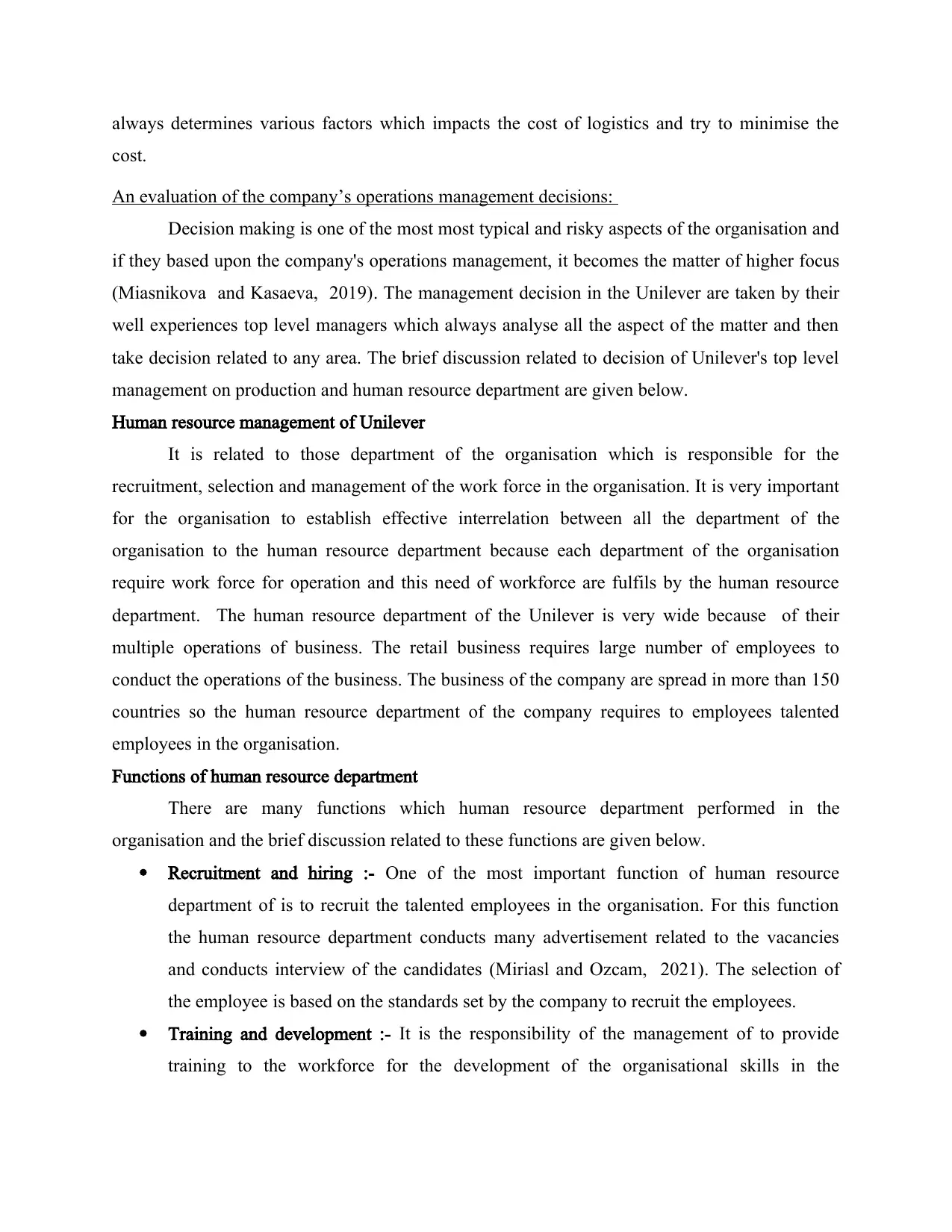
always determines various factors which impacts the cost of logistics and try to minimise the
cost.
An evaluation of the company’s operations management decisions:
Decision making is one of the most most typical and risky aspects of the organisation and
if they based upon the company's operations management, it becomes the matter of higher focus
(Miasnikova and Kasaeva, 2019). The management decision in the Unilever are taken by their
well experiences top level managers which always analyse all the aspect of the matter and then
take decision related to any area. The brief discussion related to decision of Unilever's top level
management on production and human resource department are given below.
Human resource management of Unilever
It is related to those department of the organisation which is responsible for the
recruitment, selection and management of the work force in the organisation. It is very important
for the organisation to establish effective interrelation between all the department of the
organisation to the human resource department because each department of the organisation
require work force for operation and this need of workforce are fulfils by the human resource
department. The human resource department of the Unilever is very wide because of their
multiple operations of business. The retail business requires large number of employees to
conduct the operations of the business. The business of the company are spread in more than 150
countries so the human resource department of the company requires to employees talented
employees in the organisation.
Functions of human resource department
There are many functions which human resource department performed in the
organisation and the brief discussion related to these functions are given below.
Recruitment and hiring :- One of the most important function of human resource
department of is to recruit the talented employees in the organisation. For this function
the human resource department conducts many advertisement related to the vacancies
and conducts interview of the candidates (Miriasl and Ozcam, 2021). The selection of
the employee is based on the standards set by the company to recruit the employees.
Training and development :- It is the responsibility of the management of to provide
training to the workforce for the development of the organisational skills in the
cost.
An evaluation of the company’s operations management decisions:
Decision making is one of the most most typical and risky aspects of the organisation and
if they based upon the company's operations management, it becomes the matter of higher focus
(Miasnikova and Kasaeva, 2019). The management decision in the Unilever are taken by their
well experiences top level managers which always analyse all the aspect of the matter and then
take decision related to any area. The brief discussion related to decision of Unilever's top level
management on production and human resource department are given below.
Human resource management of Unilever
It is related to those department of the organisation which is responsible for the
recruitment, selection and management of the work force in the organisation. It is very important
for the organisation to establish effective interrelation between all the department of the
organisation to the human resource department because each department of the organisation
require work force for operation and this need of workforce are fulfils by the human resource
department. The human resource department of the Unilever is very wide because of their
multiple operations of business. The retail business requires large number of employees to
conduct the operations of the business. The business of the company are spread in more than 150
countries so the human resource department of the company requires to employees talented
employees in the organisation.
Functions of human resource department
There are many functions which human resource department performed in the
organisation and the brief discussion related to these functions are given below.
Recruitment and hiring :- One of the most important function of human resource
department of is to recruit the talented employees in the organisation. For this function
the human resource department conducts many advertisement related to the vacancies
and conducts interview of the candidates (Miriasl and Ozcam, 2021). The selection of
the employee is based on the standards set by the company to recruit the employees.
Training and development :- It is the responsibility of the management of to provide
training to the workforce for the development of the organisational skills in the
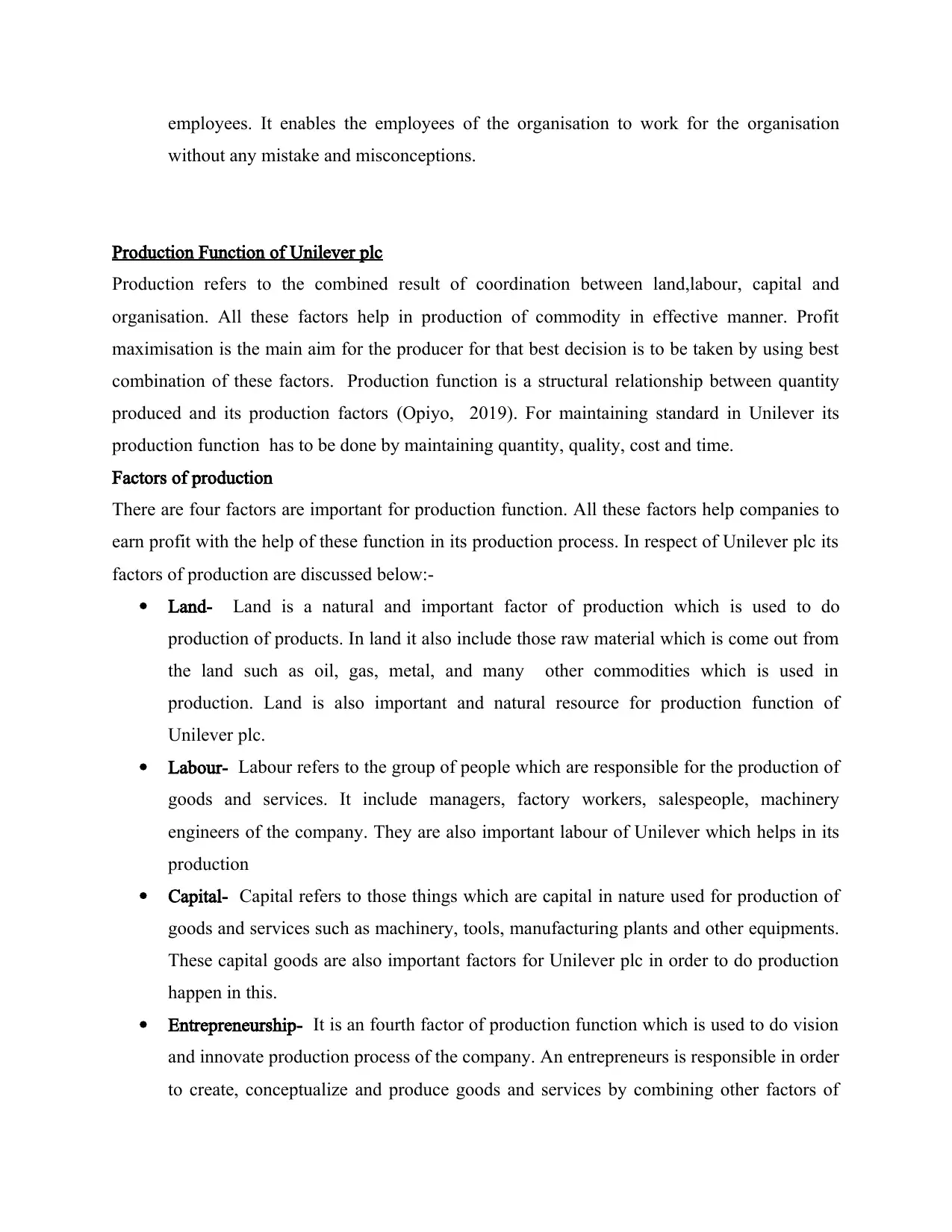
employees. It enables the employees of the organisation to work for the organisation
without any mistake and misconceptions.
Production Function of Unilever plc
Production refers to the combined result of coordination between land,labour, capital and
organisation. All these factors help in production of commodity in effective manner. Profit
maximisation is the main aim for the producer for that best decision is to be taken by using best
combination of these factors. Production function is a structural relationship between quantity
produced and its production factors (Opiyo, 2019). For maintaining standard in Unilever its
production function has to be done by maintaining quantity, quality, cost and time.
Factors of production
There are four factors are important for production function. All these factors help companies to
earn profit with the help of these function in its production process. In respect of Unilever plc its
factors of production are discussed below:-
Land- Land is a natural and important factor of production which is used to do
production of products. In land it also include those raw material which is come out from
the land such as oil, gas, metal, and many other commodities which is used in
production. Land is also important and natural resource for production function of
Unilever plc.
Labour- Labour refers to the group of people which are responsible for the production of
goods and services. It include managers, factory workers, salespeople, machinery
engineers of the company. They are also important labour of Unilever which helps in its
production
Capital- Capital refers to those things which are capital in nature used for production of
goods and services such as machinery, tools, manufacturing plants and other equipments.
These capital goods are also important factors for Unilever plc in order to do production
happen in this.
Entrepreneurship- It is an fourth factor of production function which is used to do vision
and innovate production process of the company. An entrepreneurs is responsible in order
to create, conceptualize and produce goods and services by combining other factors of
without any mistake and misconceptions.
Production Function of Unilever plc
Production refers to the combined result of coordination between land,labour, capital and
organisation. All these factors help in production of commodity in effective manner. Profit
maximisation is the main aim for the producer for that best decision is to be taken by using best
combination of these factors. Production function is a structural relationship between quantity
produced and its production factors (Opiyo, 2019). For maintaining standard in Unilever its
production function has to be done by maintaining quantity, quality, cost and time.
Factors of production
There are four factors are important for production function. All these factors help companies to
earn profit with the help of these function in its production process. In respect of Unilever plc its
factors of production are discussed below:-
Land- Land is a natural and important factor of production which is used to do
production of products. In land it also include those raw material which is come out from
the land such as oil, gas, metal, and many other commodities which is used in
production. Land is also important and natural resource for production function of
Unilever plc.
Labour- Labour refers to the group of people which are responsible for the production of
goods and services. It include managers, factory workers, salespeople, machinery
engineers of the company. They are also important labour of Unilever which helps in its
production
Capital- Capital refers to those things which are capital in nature used for production of
goods and services such as machinery, tools, manufacturing plants and other equipments.
These capital goods are also important factors for Unilever plc in order to do production
happen in this.
Entrepreneurship- It is an fourth factor of production function which is used to do vision
and innovate production process of the company. An entrepreneurs is responsible in order
to create, conceptualize and produce goods and services by combining other factors of
⊘ This is a preview!⊘
Do you want full access?
Subscribe today to unlock all pages.

Trusted by 1+ million students worldwide
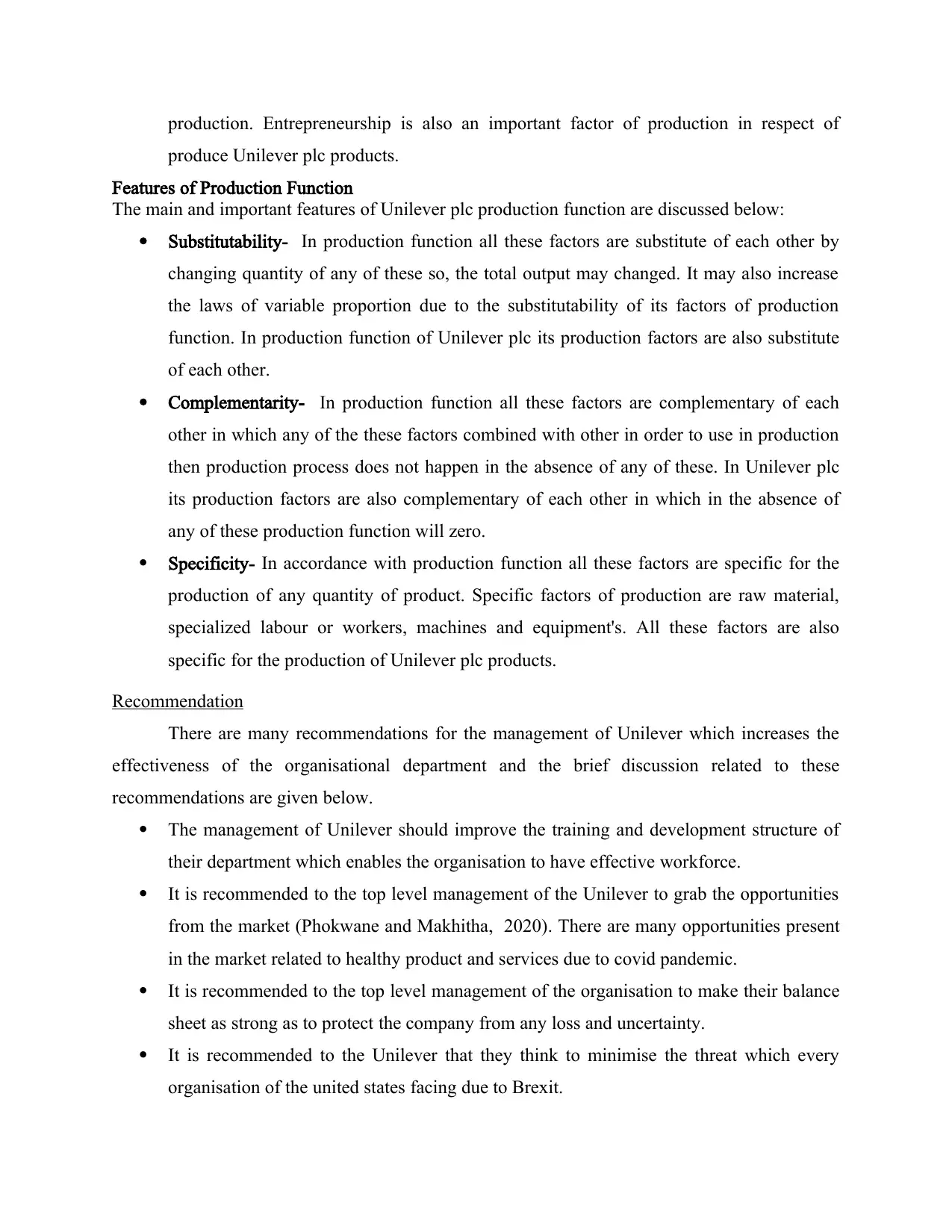
production. Entrepreneurship is also an important factor of production in respect of
produce Unilever plc products.
Features of Production Function
The main and important features of Unilever plc production function are discussed below:
Substitutability- In production function all these factors are substitute of each other by
changing quantity of any of these so, the total output may changed. It may also increase
the laws of variable proportion due to the substitutability of its factors of production
function. In production function of Unilever plc its production factors are also substitute
of each other.
Complementarity- In production function all these factors are complementary of each
other in which any of the these factors combined with other in order to use in production
then production process does not happen in the absence of any of these. In Unilever plc
its production factors are also complementary of each other in which in the absence of
any of these production function will zero.
Specificity- In accordance with production function all these factors are specific for the
production of any quantity of product. Specific factors of production are raw material,
specialized labour or workers, machines and equipment's. All these factors are also
specific for the production of Unilever plc products.
Recommendation
There are many recommendations for the management of Unilever which increases the
effectiveness of the organisational department and the brief discussion related to these
recommendations are given below.
The management of Unilever should improve the training and development structure of
their department which enables the organisation to have effective workforce.
It is recommended to the top level management of the Unilever to grab the opportunities
from the market (Phokwane and Makhitha, 2020). There are many opportunities present
in the market related to healthy product and services due to covid pandemic.
It is recommended to the top level management of the organisation to make their balance
sheet as strong as to protect the company from any loss and uncertainty.
It is recommended to the Unilever that they think to minimise the threat which every
organisation of the united states facing due to Brexit.
produce Unilever plc products.
Features of Production Function
The main and important features of Unilever plc production function are discussed below:
Substitutability- In production function all these factors are substitute of each other by
changing quantity of any of these so, the total output may changed. It may also increase
the laws of variable proportion due to the substitutability of its factors of production
function. In production function of Unilever plc its production factors are also substitute
of each other.
Complementarity- In production function all these factors are complementary of each
other in which any of the these factors combined with other in order to use in production
then production process does not happen in the absence of any of these. In Unilever plc
its production factors are also complementary of each other in which in the absence of
any of these production function will zero.
Specificity- In accordance with production function all these factors are specific for the
production of any quantity of product. Specific factors of production are raw material,
specialized labour or workers, machines and equipment's. All these factors are also
specific for the production of Unilever plc products.
Recommendation
There are many recommendations for the management of Unilever which increases the
effectiveness of the organisational department and the brief discussion related to these
recommendations are given below.
The management of Unilever should improve the training and development structure of
their department which enables the organisation to have effective workforce.
It is recommended to the top level management of the Unilever to grab the opportunities
from the market (Phokwane and Makhitha, 2020). There are many opportunities present
in the market related to healthy product and services due to covid pandemic.
It is recommended to the top level management of the organisation to make their balance
sheet as strong as to protect the company from any loss and uncertainty.
It is recommended to the Unilever that they think to minimise the threat which every
organisation of the united states facing due to Brexit.
Paraphrase This Document
Need a fresh take? Get an instant paraphrase of this document with our AI Paraphraser
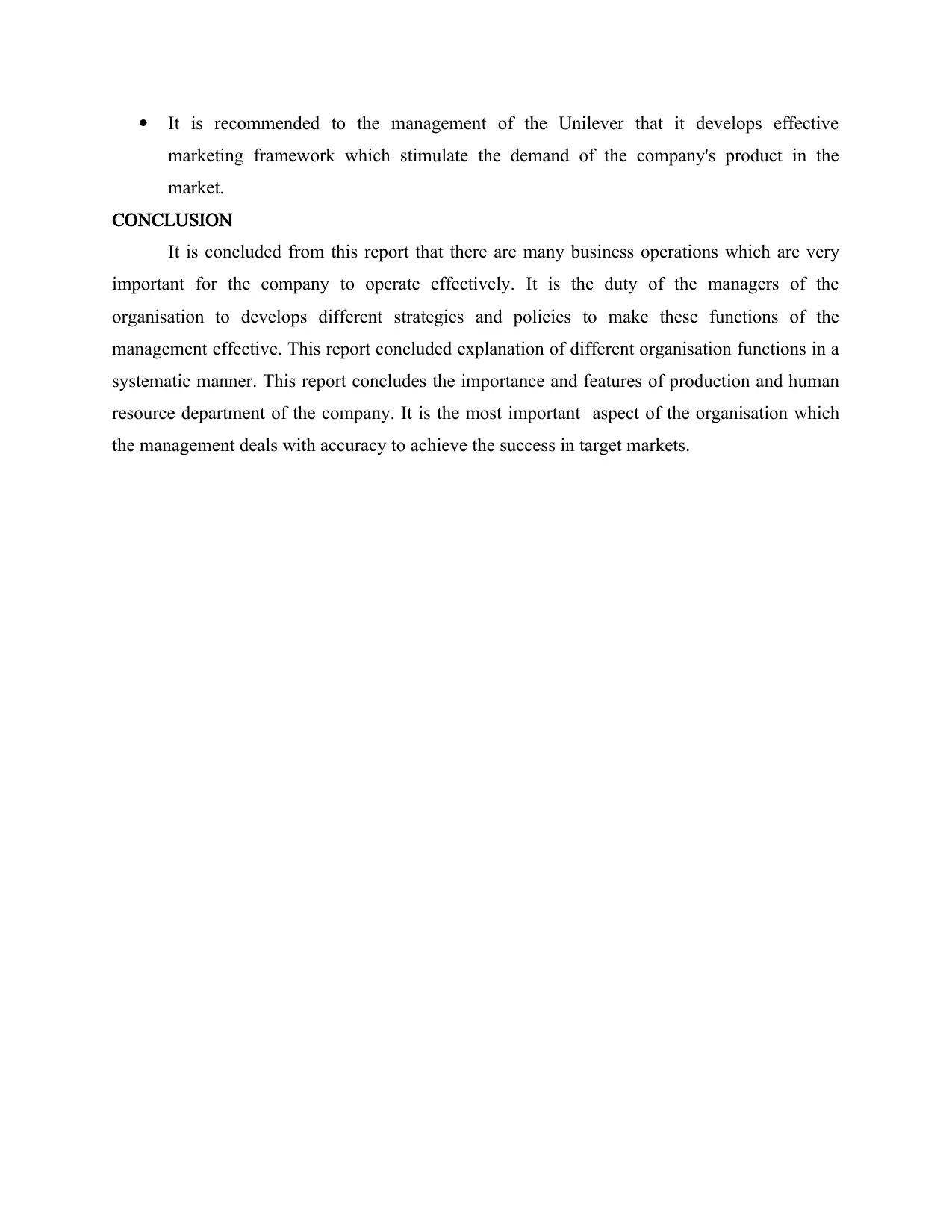
It is recommended to the management of the Unilever that it develops effective
marketing framework which stimulate the demand of the company's product in the
market.
CONCLUSION
It is concluded from this report that there are many business operations which are very
important for the company to operate effectively. It is the duty of the managers of the
organisation to develops different strategies and policies to make these functions of the
management effective. This report concluded explanation of different organisation functions in a
systematic manner. This report concludes the importance and features of production and human
resource department of the company. It is the most important aspect of the organisation which
the management deals with accuracy to achieve the success in target markets.
marketing framework which stimulate the demand of the company's product in the
market.
CONCLUSION
It is concluded from this report that there are many business operations which are very
important for the company to operate effectively. It is the duty of the managers of the
organisation to develops different strategies and policies to make these functions of the
management effective. This report concluded explanation of different organisation functions in a
systematic manner. This report concludes the importance and features of production and human
resource department of the company. It is the most important aspect of the organisation which
the management deals with accuracy to achieve the success in target markets.
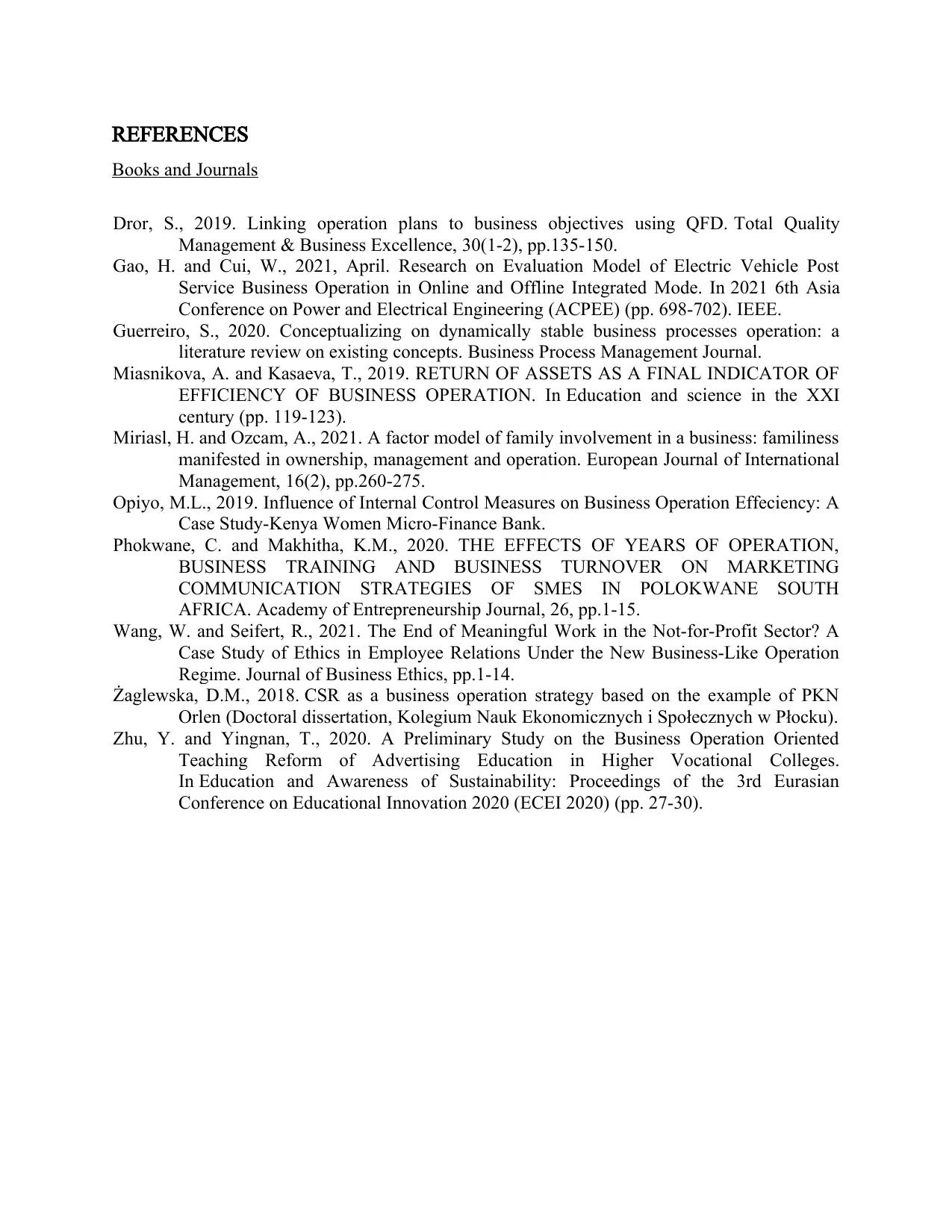
REFERENCES
Books and Journals
Dror, S., 2019. Linking operation plans to business objectives using QFD. Total Quality
Management & Business Excellence, 30(1-2), pp.135-150.
Gao, H. and Cui, W., 2021, April. Research on Evaluation Model of Electric Vehicle Post
Service Business Operation in Online and Offline Integrated Mode. In 2021 6th Asia
Conference on Power and Electrical Engineering (ACPEE) (pp. 698-702). IEEE.
Guerreiro, S., 2020. Conceptualizing on dynamically stable business processes operation: a
literature review on existing concepts. Business Process Management Journal.
Miasnikova, A. and Kasaeva, T., 2019. RETURN OF ASSETS AS A FINAL INDICATOR OF
EFFICIENCY OF BUSINESS OPERATION. In Education and science in the XXI
century (pp. 119-123).
Miriasl, H. and Ozcam, A., 2021. A factor model of family involvement in a business: familiness
manifested in ownership, management and operation. European Journal of International
Management, 16(2), pp.260-275.
Opiyo, M.L., 2019. Influence of Internal Control Measures on Business Operation Effeciency: A
Case Study-Kenya Women Micro-Finance Bank.
Phokwane, C. and Makhitha, K.M., 2020. THE EFFECTS OF YEARS OF OPERATION,
BUSINESS TRAINING AND BUSINESS TURNOVER ON MARKETING
COMMUNICATION STRATEGIES OF SMES IN POLOKWANE SOUTH
AFRICA. Academy of Entrepreneurship Journal, 26, pp.1-15.
Wang, W. and Seifert, R., 2021. The End of Meaningful Work in the Not-for-Profit Sector? A
Case Study of Ethics in Employee Relations Under the New Business-Like Operation
Regime. Journal of Business Ethics, pp.1-14.
Żaglewska, D.M., 2018. CSR as a business operation strategy based on the example of PKN
Orlen (Doctoral dissertation, Kolegium Nauk Ekonomicznych i Społecznych w Płocku).
Zhu, Y. and Yingnan, T., 2020. A Preliminary Study on the Business Operation Oriented
Teaching Reform of Advertising Education in Higher Vocational Colleges.
In Education and Awareness of Sustainability: Proceedings of the 3rd Eurasian
Conference on Educational Innovation 2020 (ECEI 2020) (pp. 27-30).
Books and Journals
Dror, S., 2019. Linking operation plans to business objectives using QFD. Total Quality
Management & Business Excellence, 30(1-2), pp.135-150.
Gao, H. and Cui, W., 2021, April. Research on Evaluation Model of Electric Vehicle Post
Service Business Operation in Online and Offline Integrated Mode. In 2021 6th Asia
Conference on Power and Electrical Engineering (ACPEE) (pp. 698-702). IEEE.
Guerreiro, S., 2020. Conceptualizing on dynamically stable business processes operation: a
literature review on existing concepts. Business Process Management Journal.
Miasnikova, A. and Kasaeva, T., 2019. RETURN OF ASSETS AS A FINAL INDICATOR OF
EFFICIENCY OF BUSINESS OPERATION. In Education and science in the XXI
century (pp. 119-123).
Miriasl, H. and Ozcam, A., 2021. A factor model of family involvement in a business: familiness
manifested in ownership, management and operation. European Journal of International
Management, 16(2), pp.260-275.
Opiyo, M.L., 2019. Influence of Internal Control Measures on Business Operation Effeciency: A
Case Study-Kenya Women Micro-Finance Bank.
Phokwane, C. and Makhitha, K.M., 2020. THE EFFECTS OF YEARS OF OPERATION,
BUSINESS TRAINING AND BUSINESS TURNOVER ON MARKETING
COMMUNICATION STRATEGIES OF SMES IN POLOKWANE SOUTH
AFRICA. Academy of Entrepreneurship Journal, 26, pp.1-15.
Wang, W. and Seifert, R., 2021. The End of Meaningful Work in the Not-for-Profit Sector? A
Case Study of Ethics in Employee Relations Under the New Business-Like Operation
Regime. Journal of Business Ethics, pp.1-14.
Żaglewska, D.M., 2018. CSR as a business operation strategy based on the example of PKN
Orlen (Doctoral dissertation, Kolegium Nauk Ekonomicznych i Społecznych w Płocku).
Zhu, Y. and Yingnan, T., 2020. A Preliminary Study on the Business Operation Oriented
Teaching Reform of Advertising Education in Higher Vocational Colleges.
In Education and Awareness of Sustainability: Proceedings of the 3rd Eurasian
Conference on Educational Innovation 2020 (ECEI 2020) (pp. 27-30).
⊘ This is a preview!⊘
Do you want full access?
Subscribe today to unlock all pages.

Trusted by 1+ million students worldwide
1 out of 9
Related Documents
Your All-in-One AI-Powered Toolkit for Academic Success.
+13062052269
info@desklib.com
Available 24*7 on WhatsApp / Email
![[object Object]](/_next/static/media/star-bottom.7253800d.svg)
Unlock your academic potential
Copyright © 2020–2025 A2Z Services. All Rights Reserved. Developed and managed by ZUCOL.




